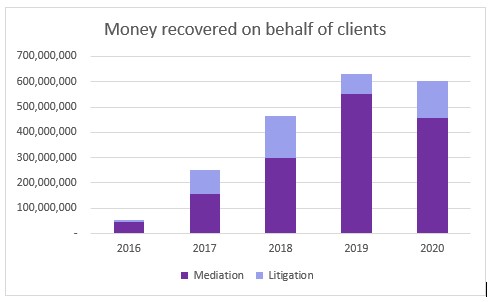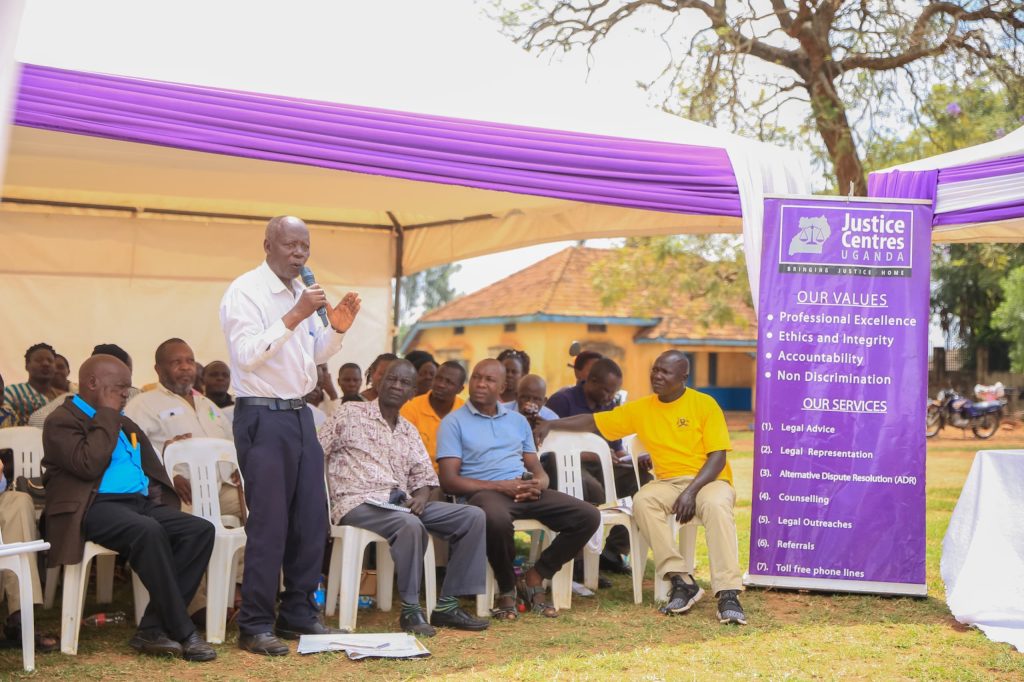JCU was established in 2009 to provide free legal services to the poor, vulnerable and marginalised individuals and communities of Uganda to realise their rights. The JCU Model seeks to empower vulnerable communities through provision of quality human rights based legal aid services, community outreaches and advocacy to claim their rights and demand for policy and social change.
JCU reaches out to hard-to-reach areas where little or no resources for constructive dispute resolution are available.
Vulnerable communities accessing quality legal aid services and realizing their rights.
To empower vulnerable communities through provision of quality human rights based legal aid services, community outreach and advocacy.
Currently, there are thirteen Justice Centres nationwide, with the National Coordination Office which is located at the Judiciary Registry of Planning & Development, Plot 6 George Street. The thirteen Justice Centres are located in the Districts of Kampala, Fort Portal, Hoima, Jinja, Masaka, Mubende, Mukono, Mbale, Tororo, Lira, Bundibugyo, Kasese and Yumbe.
Conditions for the poor in Uganda
The essence and basic tenets of legal aid consist in human rights obligations of the State to ensure and guarantee unrestricted access to justice by all its citizens. The reality is that a large percentage of Ugandans cannot afford legal services due to conditions of extreme deprivation. The 2016/2017 Uganda National Panel Survey by the Uganda Bureau of Statistics (UBOS) showed that at least 21% of Ugandans are chronically poor (having been poor during more than one time period) and on average spend less than US$1.2 (UGX 4,000) per day. According to LASPNET 80% of Ugandans cannot afford legal representation (Laspnet, 2018; Factsheet on Legal Aid in Uganda.).
State Brief Scheme – Legal Aid for everyone?
In Uganda, the State under the Constitution, is mandated to provide legal aid for persons accused of capital offences (ARTILCE 28(3)(e) of the Constitution). This is also known as the State Brief Scheme. However, the State Brief Scheme only caters for criminal cases but not all criminal cases – specifically capital offences. This essentially leaves out persons with civil matters and other criminal offences who cannot afford a lawyer. This makes it hard for such persons since court and legal processes and procedures are complex and one requires a lawyer to ably navigate the process.
Why Legal Aid?
It is important to note that legal aid is more holistic and goes beyond court representation. It also includes; legal education/ awareness and alternative dispute resolution, among others.
This is key because rights awareness is low among many people – especially the indigent and vulnerable. Those who are lucky enough to know their rights might not be able to afford a lawyer. So, persons who cannot afford a lawyer or paid legal services are at a disadvantage because the state does not fully provide legal services to them.
The National Legal Aid Bill – a small step with big impact
Through the State brief scheme and the establishment of JCU, the government is involved in the provision of legal aid. Nonetheless, geographical limitations and the sheer number of cases leads to a gap in the provision of legal aid which is bridged by various organizations and NGOs that help those who are indigent and cannot afford a paid lawyer.
However, there is no policy or legal framework that governs the various legal aid service providers. That’s why there is a need for a National Legal Aid Law. The law will address all aspects of legal aid:
The role of Justice Centres Uganda
Essentially, the objective for the creation of Justice Centres Uganda by JLOS and the Judiciary was to enhance, deepen and widen access of the poor, the marginalized and the vulnerable groups to justice in Uganda. In line with JLOS strategic objective, JCU was established to supplement the ongoing government interventions of the State Brief Scheme that catered for capital offences only.
Against this background, Justice Centres Uganda was established within the Judiciary by Chief Justice Circular number one of 2010 as a project of JLOS. The establishment of Justice Centres Uganda was done after a consultative process that was undertaken from 2006–2008. This process involved Civil Society Organisations, the Ministry of Justice & Constitutional Affairs, the Justice Law and Order Sector (JLOS) and Development Partners. It is from this process that it was agreed that there was need for involvement of the State in the provision of legal aid to the people of Uganda. JCU was therefore established to provide lessons to support the development of a National Legal Aid Policy and Law, as well as the establishment of a comprehensive National Institution on Legal Aid.
The establishment of JCU has already made an impact for its indigent and vulnerable clients: In the years 2016-2020 approximately 2 Billion UGX has been recovered on the behalf of the clients of JCU.

To respond to the current challenges and opportunities, four strategic objectives have been identified by JCU under our strategic plan.
To enhance awareness of legal and human rights and empower communities to realise their rights.
To enable vulnerable individuals and communities to effectively resolve disputes using both litigation and mediation.
To undertake evidence-based Advocacy for reform of Laws, Policies and Practices to facilitate access to justice for the poor.
One of the foundations of JCU’s advocacy work lies in a dense and extensive Monitoring & Evaluation Strategy. By using a Results Based Monitoring and Management approach is the performance of JCU and its staff assessed, evaluated and improved. Equally important is that the outcomes do serve as a direct indicator of which legal topics are the most relevant and challenging to the indigent, vulnerable and marginalised people in Uganda.
The results highlight the fields where a change in legislation would be favourable and where advocacy is needed to push the reform of laws, policies and practices to facilitate access to justice for the indigent.
A yearly report providing insights about how JCU has facilitated accessing justice for indigent and vulnerable people in Uganda is produced. Additionally, further research topics concerning access to justice and the impact of accessing legal aid are relevant and examined within the JCU departments.
JCU furthermore, aims to establish and strengthen its partnerships with national and international academic and research institutions to create a solid network of collaborators in the field of legal justice research. Together and with our findings we are able to lobby for changes in law, policies and practices to support social change in Uganda in the long run.


Call JCU for free legal advice
Mengo: 0800 100 225
Tororo: 0800 100 226
Lira: 0800 100 212
Hoima: 0800 100 213
Jinja: 0800 100 214
Masaka: 0800 100 215 National Coordination Office: 0414 256626
Fort Portal: 0800 100 216
Mubende: 0800 100 217
Mukono: 0800 100 218
Mbale: 0800 100 219
Bundibugyo: 0800 100 223 Kasese: 0800 100 224 Yumbe: 0200 906 833